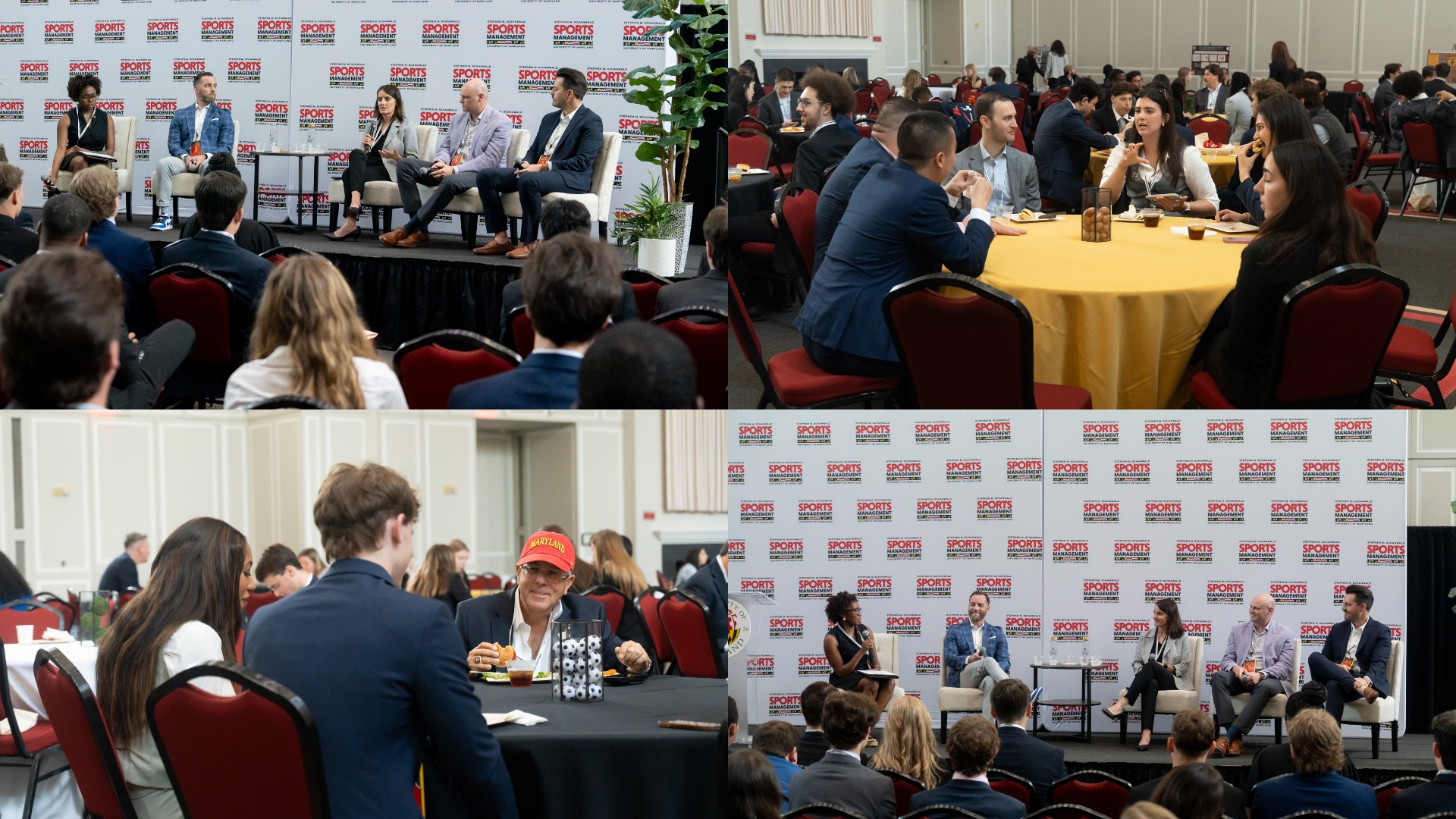
By James Consoli
The field of sports is a fast-paced environment, and the University of Maryland’s Robert H. Smith School of Business is equipping students with the skills not just to keep up but to lead the way.
This notion was evident during the 5th Annual Maryland Sports Business Conference held on Friday, May 2, at the Samuel Riggs IV Alumni Center. The event brought together a diverse group of 14 panelists and five moderators, contributing their expertise across various sectors of the sports business world.
This year’s event marked the inaugural cohort of the newly named Stephen M. Schanwald Sports Management Program, following Schanwald’s $8 million donation to the Smith School in December and part of an $18 million donation to the university.
Schanwald ’77 underscored its value in connecting students with industry professionals and staying informed about major trends.
“Marketing and management theory is fine, but there is nothing like learning directly from the people who are actually in the arena, fighting the battle daily to build their organization’s brand, enhance their organization’s reputation and generate the revenue necessary to compete,” said Schanwald.
The conference began with breakfast, followed by a welcome address from Smith School undergraduate students and conference co-executive directors Ava Meyer ’26, Jack Manchester ’26 and Valentyna Breslawec ’25.
The first panel featured Washington Commanders’ Senior Vice President and Chief Partnerships Officer Jim Rushton, who discussed his NFL experience and how wins and losses on the field impact his work away from it.
Panel discussions continued throughout the rest of the day, with choice panels for attendees including an array of topics, like a sports broadcast panel and a sports law panel.
“Something I liked about the broadcast panel was the perspective on how the panelists have worked with athletes in broadcasting and creating their content,” said Jackson Wantman, a sophomore admitted to Cohort 3 of the Schanwald Sports Management Program. “As a journalism student who wants to break into sports media, interacting with athletes in the right way is crucial, so I liked hearing about how to do that.”
The sports law panel featured Leandre Anthony of Octagon Sports, Sophie Gage of the NFL Players Association and Craig Thompson, UMD ’92, of Venable LLP and the UMD College Park Foundation.
The legal specialists discussed NIL, athlete representation in contracts, arena partnerships, stadium construction and working with NFL players on brand deals.
Freshman Quint Flannery ’27 found the sports law panel interesting, noting the panelists' specialization.
“It was very interesting to see how they are specialists in their own thing,” Flannery said. “It’s not like someone is doing everything; they become masters at their one job.”
The final two panels, which touched on professional team marketing, player partnerships and data analytics, were primarily comprised of UMD alumni.
Among the participating data analytics panelists was Leah Royer, vice president of database marketing at Monumental Sports, who noted the substantial growth in data analytics positions across sports in recent years. Reece Fischer ’07, vice president of strategy and analytics at the NHL, echoed this, stating that data careers in sports significantly grew after he had entered the workforce.
“It wasn’t until I went back to graduate school that I was like ‘Oh this is a thing that I could do,’” said Fischer. “Data existed, but not nearly the way that it does now.”
Stephen States, MBA ’20, a senior manager in data science and analytics for the Baltimore Ravens, discussed how data connects his passion for sports and mathematics. However, he cautioned against its sole reliance in decision-making, referencing a cartoon he recently came across regarding model accuracy.
“The junior data scientist said, ‘Wow, my model accuracy is 100% accurate, this is great,’ and the senior data scientist said, ‘My model accuracy is 100%, what did I do wrong?’” said States. “So it’s understanding that models get you a lot of the way there, but they should never be the only piece of information you are taking into a decision.”
As they wrapped up their insights on the present state of data analytics, the panelists briefly looked towards the future, mentioning the emergence of tools like ChatGPT and AI and offering a word of caution about their current limitations in providing definitive answers.
Following the final panel, Breslawec announced the 6th Annual Sports Business Conference for April 17, 2026.
With the date for the next annual conference set, Schanwald, a key benefactor whose vision is actively helping to shape and elevate the sports business education at the university, already stated his intention to attend next year.
“I know I don’t plan to miss one of these conferences in the future in order to stay abreast of current trends in the industry.”
Media Contact
Greg Muraski
Media Relations Manager
301-405-5283
301-892-0973 Mobile
gmuraski@umd.edu
About the University of Maryland's Robert H. Smith School of Business
The Robert H. Smith School of Business is an internationally recognized leader in management education and research. One of 12 colleges and schools at the University of Maryland, College Park, the Smith School offers undergraduate, full-time and flex MBA, executive MBA, online MBA, business master’s, PhD and executive education programs, as well as outreach services to the corporate community. The school offers its degree, custom and certification programs in learning locations in North America and Asia.